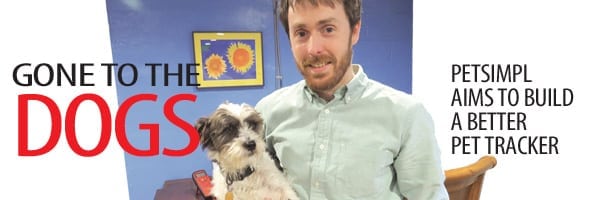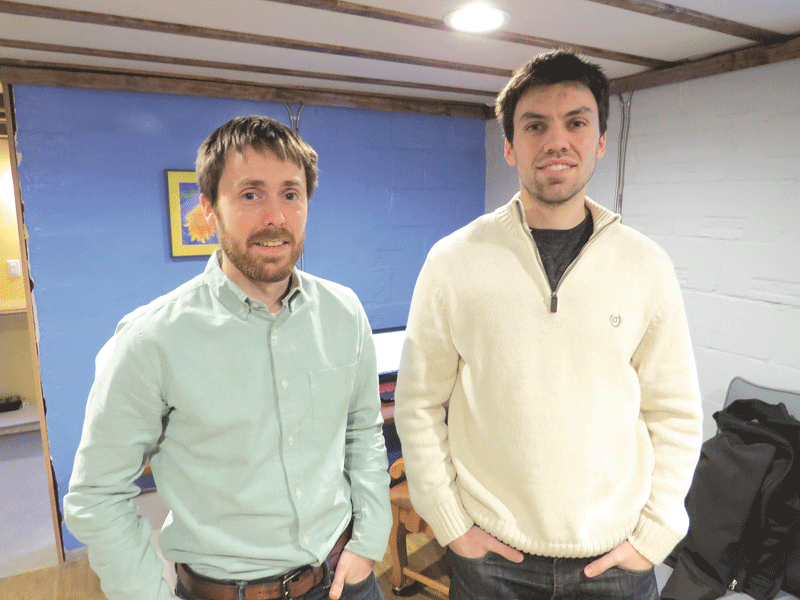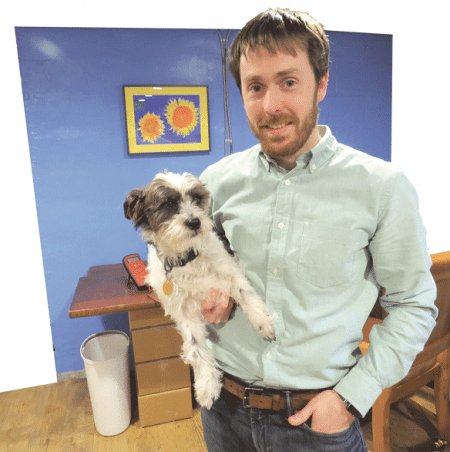
PetSimpl Gets Ready to Unveil Its Pet Tracker
Dogged Determination
Dave Waymouth had an itch to earn his MBA. His dog simply had an itch to escape. Those two worlds collided when Waymouth entered the UMass Innovation Challenge with an idea: to develop and market a more effective pet tracker than the ones he had researched, with some disappointment, on the Internet. Fast-forward two years, and his startup company, PetSimpl, is preparing to unveil a device called Pip, which uses GPS and Bluetooth technology to keep dogs safe, track their exercise levels, and potentially much more.
Dave Waymouth calls his 15-pound dog, Pip, an escape artist.
“We had him for only a short while, and he ran off,” Waymouth told BusinessWest. “I’d never had a dog before; I’d always had outdoor cats, and they go and come back. But a dog follows its nose. So this was a panic moment. I thought, ‘there’s nothing I can do; I hope someone calls the number on the collar.’”
Dog and owner were reunited, but it wasn’t the last time Pip tried to get free. So Waymouth started scouring the Internet for a product that would alert him to potential escapes and help him recover the dog.
“I assumed there were products on the market and searched around. I found stuff for hunting dogs, but they were really expensive and really bulky. One product on the market looked like it would work, but it was expensive, and when I did buy it, it was too big, so I returned it.”
While that struggle was going on at home, Waymouth was running a video-marketing company in Northampton. Its product was a channel on area hotel-room televisions — in fact, the channel that automatically appeared when the TV was switched on — that highlighted local dining and attractions; area businesses paid Waymouth to advertise on the channel.
It was a good idea, one he’d picked up working for larger marketing firms in bigger cities, but he questioned its scalability. Besides, as someone who had studied English and film studies as an undergraduate, he felt he needed more business expertise, so in 2013, he returned to UMass to enroll in the MBA program at the Isenberg School of Management.
There, he was exposed to the Innovation Challenge, a competition during which potential entrepreneurs develop product ideas and pitch them to judges. That’s when he thought of his dog.
“Honestly, the night before the application for the competition was due, I was sitting there saying, ‘I’ve got to think of an idea. I should just pick something that excites me and go with it.’”
His idea was a canine GPS tracker small enough to fit even compact dogs, yet with much better reliability and battery life than the products he had researched online. “That was the innovation — we’d keep it small and have 10 times the battery life of similar devices.”
 Fast-forward two years, and that idea has become a company called PetSimpl, and a tracking device called — of course — Pip, which alerts owners with Bluetooth if a dog leaves a pre-set area and activates a GPS tracker on a smartphone app to locate the furry runaway. When the dog is in the ‘safe zone,’ the device operates at minimal power, extending typical battery life to about three months between recharging sessions.
Fast-forward two years, and that idea has become a company called PetSimpl, and a tracking device called — of course — Pip, which alerts owners with Bluetooth if a dog leaves a pre-set area and activates a GPS tracker on a smartphone app to locate the furry runaway. When the dog is in the ‘safe zone,’ the device operates at minimal power, extending typical battery life to about three months between recharging sessions.
Currently in the final stages of production, after which it will be shipped to customers who preordered it, Pip is also a kind of “Fitbit for dogs,” Waymouth said, serving not only as a tracker, but also as a way to monitor a dog’s activity levels using that same app.
“We can tell you how much exercise he’s getting during the day and how far he’s walked. It’s useful for people with dog walkers, especially, to make sure the dog is getting a long-enough walk. Parents can use the app to keep track of their kids walking the dog. I found a lot of parents are excited about being able to check all this stuff. We’re using technology that’s already out there, but in a way that’s useful for day-to-day pet care.”
In this, the latest in a series of articles highlighting entrepreneurial endeavors across the region, BusinessWest sheds some light on a device that promises to improve the lives of dogs — and the people who worry about them.
Idea to Reality
The Pip product didn’t appear overnight. Rather, it emerged from the supportive world of startup incubators and crowd-funding campaigns.
“I’m a big tech guy. While I was in video marketing, and I studied English and film in college, I had been taking things apart from a very young age.”
Still, he went on, Pip was only an idea at first, not anything resembling a company. But what the UMass Innovation Challenge, and later the MassChallenge accelerator program in Boston, gave him was a chance to have that idea validated by others, and to develop a real business plan.
“That gave us a ton of exposure, and we were able to partner with Verizon,” he explained. “When they saw it, they offered us a good deal to put it in their network.”
Verizon’s saturation coverage of the country gives PetSimpl needed cachet in the tech world, he explained. “The U.S. is the world’s largest pet market, and we’re a tiny company, so we don’t have to take over the world just yet. It’s good to be attached to a large name brand; other networks are not as reliable.”

Dave Waymouth (left, with Seth Berggren) says he hasn’t been too aggressive in marketing Pip, preferring to launch at a manageable pace.
During his four months with MassChallenge, during the second year of his MBA program at Isenberg, Waymouth was staying with a family friend near Boston from Monday through Wednesday, taking classes online, then returning to his home in Northampton and attending a couple of classes on campus on Thursday and Friday. Fortunately, he said, the culture at Isenberg is to be flexible with students balancing MBA studies with, well, trying to make it in business. “They helped me finish my degree while starting this company.”
Around the same time, Scott Foster, president of Valley Venture Mentors and someone Waymouth considers a mentor, tipped him off about VVM’s accelerator program in Springfield — a much closer commute than Boston. So he enrolled in that four-month program, where he eventually won $32,500 in VVM’s Accelerator Awards — the second-highest award among 29 participants — to further fund the development of Pip.
Meanwhile, he launched a Kickstarter campaign, with an initial goal of $50,000, to verify that sufficient demand existed in the market. “We felt, if we got to that point, there were enough people interested out there to make it a viable product,” he told BusinessWest. “We didn’t want the Kickstarter to go too viral, since a lot of companies take on way too many orders and get overwhelmed.”
The campaign wound up raising $75,000 on the strength of more than 400 preorders, and Waymouth has since continued taking preorders — at a slightly higher price — from people who came across PetSimpl too late to take part in the Kickstarter campaign.
“We haven’t really been marketing it,” he said, “but just letting people find us as we get ready to ship out the first batch.”
Collaring a Problem
One of Waymouth’s main concerns has been the reliability of the Bluetooth signal, but he reports that it outperforms 90% of cellphones. “We’re now just finishing the casing, which is what holds the circuit board together. We had to make it waterproof and minimize how far it hangs off the collar.”
Noting that Pip has gone through six or seven designs, he noted that product development early on, without funding, was extremely difficult.
However, before the final round of the UMass Innovation Challenge, he won a grant for a couple thousand dollars, which he used to hire an electrical engineer to look at his basic designs and see if he could turn it into a circuit board.
Waymouth had to be resourceful early on, such as when he bartered office space at MassChallenge for his first website design. But once the Kickstarter campaign was over, he was able to hire his first employee, Seth Berggren, as hardware lead. Patrick Kearney came on soon after as software lead.
“I became a master of getting people interested and excited with the promise of future success,” he said of not only his team, but those who preordered. “I’m happy to say, everything I promised to them, we’ve followed through on. Patrick was just going to develop the app for us, but fell in love with the product and came on full-time. Everyone is juggling multiple roles. And we have six or seven people involved as contract workers.”
The team has faced down a number of thorny — often literally — problems.
“We were unwilling to satisfy ourselves with the status quo,” Waymouth said, explaining that pet trackers he had researched have a tendency to catch on branches while the dog runs in the woods.
Some companies have designed devices with a stronger snap that holds it together, only to find that the whole collar gets pulled off. PetSimpl’s solution is to attach the device around the collar, with the circuit board on one side and the battery on the other, the whole piece sliding around the collar so that the smallest piece possible hangs over.
The company promises to develop additional products in the future, among them a pet door that opens only for a Pip-equipped animal, and a programmable food dispenser that knows when and how much food to release.
But for now, Waymouth said, he’s excited to get the first iteration of Pip manufactured and shipped.
“Thankfully, our competition has stumbled a little bit, shipping products too early. The customers who have ordered Pip understand that, and will wait for a product that works,” he explained. “Our main competition [among startups] is a Silicon Valley company with millions in funding, so, in many ways, we’re definitely the little guys, trying to do this in Western Massachusetts. But we feel confident, and hopefully we’ll have some good reviews at launch, and we’ll move forward from there.”
Paws and Effect
Waymouth has looked into non-battery-powered options for Pip. Solar power intrigues him, but with such a small device, solar power could prove erratic, especially for dogs with long fur. “There’s no point if you can’t get the signal. That’s a huge problem.”
But he and his team will continue to hone their product in any way that makes sense, he said, again repeating the mantra that the pet-owner market is an enthusiastic and loyal one, as long as a product does what it promises. And when the promise is to keep a family member from running away, that’s a serious pact indeed.
“This particular product has had a huge uphill battle,” he said. “Since people learned about GPS, they’ve been trying to create a viable GPS tracker, and the challenge has always been size, battery life, and performance. We’ve had a lot to overcome, because it’s difficult to convince investors who have tried these crappy products over the past 10 years and say, ‘yes, I’ve seen this, and it failed.’ We’ve studied the same history they have, and we have answers, but some investors didn’t want to touch it.”
However, many were willing to back PetSimpl and the Pip tracker, and Waymouth will soon learn whether he made the right move putting video marketing on the back burner and watching his career go to the dogs.
“It takes longer to launch a physical thing than a service,” he told BusinessWest, “but the sky’s the limit if we get a good product out there. So we’re excited.”
Joseph Bednar can be reached at [email protected]





